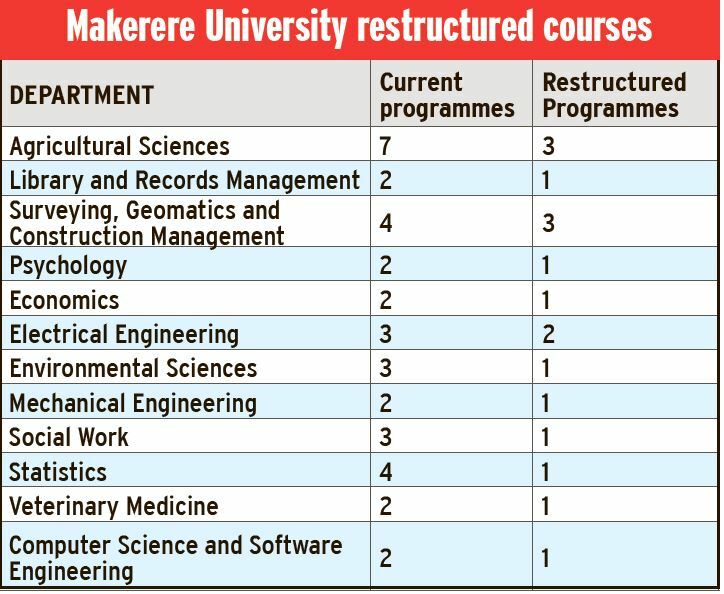Makerere scraps 20 courses
The university had 18 bachelors degree programmes in 1990, with 5,597 students — all government sponsored.
EDUCATION | UNIVERSITY
Makerere University Council has approved the restructuring of 20 undergraduate programmes, a move that will see 82 courses reduced to 62.
The new curriculum will take effect in the next academic year, which starts in August 2021.
Dr Vincent Ssembatya, the director of quality assurance, said the aim was to enhance quality at the university and spur research.
He said the university wanted to increase the percentage of science, technology, engineering and mathematics (STEM) students from 35% to at least 40% of the total enrolment.
It also wanted to increase the proportion of graduate students from 10% to 30%, support curriculum that leverages research in the university and reduce duplication.
Another reason was to support efficient utilisation of human and financial resources.
"We are going to be research-led and focus more on graduate training. Our curriculum is going to face more in the direction of science and technology to the level of about 40%. The country will not thrive without these disciplines," Ssembatya said.
He, however, said the graduate students would not be more than the undergraduates.
"For every 10,000 students admitted at the university each year, 4,000 will be graduate students," Ssembatya said.
He said humanity courses such as social sciences and law, which have been accounting for 60% of the courses, would be shrunk.

NCHE speaks out
The National Council of Higher Education (NCHE) chairperson, Prof. Elly Katunguka, welcomed the move, saying the law allows each university to determine which course to run.
Ssembatya said some of the programmes that used to bring in big numbers, such as development studies, had been changed into a unit in other courses.
"So, continuing students will do development studies as an optional subject."
Courses
Ssembatya said community psychology as well as industrial and organisational psychologyhad been merged into one programme.
He said medicine needed a lot of specialists such as gynaecologists, opticians and dentists.
"If we started an undergraduate programme for every speciality, someone would only know a little bit in an area. Yet for medical training, someone who is a dentist needs to understand the anatomy of the whole head and the circulation system. You just do not end up on a tooth," Ssembatya said.
He said all medicine students would do the broader degree first then go back to specialise.
"The graduate training will also support research because the person coming to do research at master's level will be required to have a strong basis at the undergraduate level," Ssembatya said.
He also said the seven agricultural science programmes will be merged into three. These include bachelor of science in agriculture, bachelor of science in agricultural land use and management, bachelor of agribusiness management, bachelor of agricultural and rural innovation.
Other agricultural programmes proposed for merger are bachelor of science in horticulture, bachelor of science in human nutrition and bachelor of science in food science and technology.
Under engineering, the university has proposed to merge bachelor of science in telecommunication engineering, computer engineering and biomedical engineering.
All these will be revert to electrical engineering.
Effect on staff
Ssembatya said permanent staff at the university would not be affected much because initially, they had been teaching two different programmes and the course units cut across the programmes being merged.
He said they had met with President Yoweri Museveni last year and the Government had committed to taking up the wage bill.
Background
Makerere's undergraduate curriculum initially comprised 80 bachelors degree programmes in 10 colleges and one upcountry campus.
The current programmes are a major reduction from the 102 undergraduate programmes that were being taught in 2014, which included 11 undergraduate diploma courses.
The university had 18 bachelors degree programmes in 1990, with 5,597 students — all government sponsored. In 2009, the curriculum was reviewed with the discontinuation of 12 bachelors programmes.